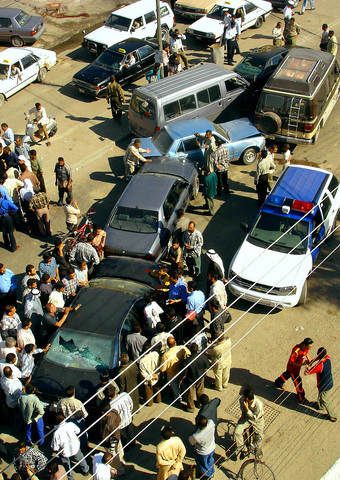Militants killed five police officers -- including a police commissioner -- on the second anniversary of the US-led invasion of Iraq, as the insurgency pressed on with its tactic of targeting Iraqi security forces, Shiites and Kurds and focusing less on US troops.
Newly elected Shiite and Kurdish leaders marked the March 19, 2003, start of the war with a fresh promise to form a government by the end of the month, when the National Assembly convenes for only the second time, nearly two months after lawmakers were elected.
In Waco, Texas, US President George W. Bush said "the Iraqi people are taking charge of their own destiny."

PHOTO: AP
In his weekly radio address, Bush saluted the more than 1,500 troops who have died in the war.
"I know that nothing can end the pain of the families who have lost loved ones in this struggle, but they can know that their sacrifice has added to America's security and the freedom of the world," he said. "Because of our actions, freedom is taking root in Iraq, and the American people are more secure."
In violence Saturday, gunmen killed Ahmed Ali Kadim, a Baghdad regional police commissioner, as he traveled to his office in the Doura neighborhood. In the oil-rich northern city of Kirkuk, attackers killed a policeman, then bombed his funeral procession, killing three other officers, including the cousin of Jalal Talabani, the Kurdish leader pegged to become Iraq's next president.
A suicide attacker trying to kill US troops in the insurgent stronghold of Ramadi, 112km west of Baghdad, prematurely detonated his car bomb, killing only himself, Iraqi police and the US military said.
Despite the continuing attacks, the top US general in Iraq, Army General George Casey, said recently that the level of violence against US troops had dropped significantly since the Jan. 30 elections. That appeared to be the result of a tactical shift by the insurgency, made up mostly of Sunni Arabs who were dominant under Saddam, to focus violence on majority Shiites and Kurds, two groups persecuted under the dictator's Baath Party rule.
The Jordanian-born terrorist mastermind Abu Musab al-Zarqawi and his al-Qaeda in Iraq group have said they hope their relentless wave of bombings, kidnappings and beheadings will lead to a sectarian war.
Shiites make up about 60 percent of Iraq's 26 million people, while Sunni Arabs make up about 20 percent of the population. Kurds, who are Sunni but mostly secular, make up 15 to 20 percent.
Sunni Arabs mostly stayed away from the elections, either because they feared reprisals or because they chose to boycott them.
"The terrorists have one policy. They want to prevent the formation of a democratic government and want to draw the people of Iraq into a sectarian war," said Ali al-Faisal, a member of the Shiite clergy-backed United Iraqi Alliance.
"In the past, they were targeting the American forces because they were in charge of security. After the new Iraqi army and police were established, and succeeded in maintaining security and began annihilating them, they shifted their attacks. But they will fail because there is a real intent to fight terrorism," al-Faisal said.

POLITICAL PRISONERS VS DEPORTEES: Venezuela’s prosecutor’s office slammed the call by El Salvador’s leader, accusing him of crimes against humanity Salvadoran President Nayib Bukele on Sunday proposed carrying out a prisoner swap with Venezuela, suggesting he would exchange Venezuelan deportees from the US his government has kept imprisoned for what he called “political prisoners” in Venezuela. In a post on X, directed at Venezuelan President Nicolas Maduro, Bukele listed off a number of family members of high-level opposition figures in Venezuela, journalists and activists detained during the South American government’s electoral crackdown last year. “The only reason they are imprisoned is for having opposed you and your electoral fraud,” he wrote to Maduro. “However, I want to propose a humanitarian agreement that

Young women standing idly around a park in Tokyo’s west suggest that a giant statue of Godzilla is not the only attraction for a record number of foreign tourists. Their faces lit by the cold glow of their phones, the women lining Okubo Park are evidence that sex tourism has developed as a dark flipside to the bustling Kabukicho nightlife district. Increasing numbers of foreign men are flocking to the area after seeing videos on social media. One of the women said that the area near Kabukicho, where Godzilla rumbles and belches smoke atop a cinema, has become a “real

Two Belgian teenagers on Tuesday were charged with wildlife piracy after they were found with thousands of ants packed in test tubes in what Kenyan authorities said was part of a trend in trafficking smaller and lesser-known species. Lornoy David and Seppe Lodewijckx, two 19-year-olds who were arrested on April 5 with 5,000 ants at a guest house, appeared distraught during their appearance before a magistrate in Nairobi and were comforted in the courtroom by relatives. They told the magistrate that they were collecting the ants for fun and did not know that it was illegal. In a separate criminal case, Kenyan Dennis

‘POINT OF NO RETURN’: The Caribbean nation needs increased international funding and support for a multinational force to help police tackle expanding gang violence The top UN official in Haiti on Monday sounded an alarm to the UN Security Council that escalating gang violence is liable to lead the Caribbean nation to “a point of no return.” Special Representative of the UN Secretary-General for Haiti Maria Isabel Salvador said that “Haiti could face total chaos” without increased funding and support for the operation of the Kenya-led multinational force helping Haiti’s police to tackle the gangs’ expanding violence into areas beyond the capital, Port-Au-Prince. Most recently, gangs seized the city of Mirebalais in central Haiti, and during the attack more than 500 prisoners were freed, she said.